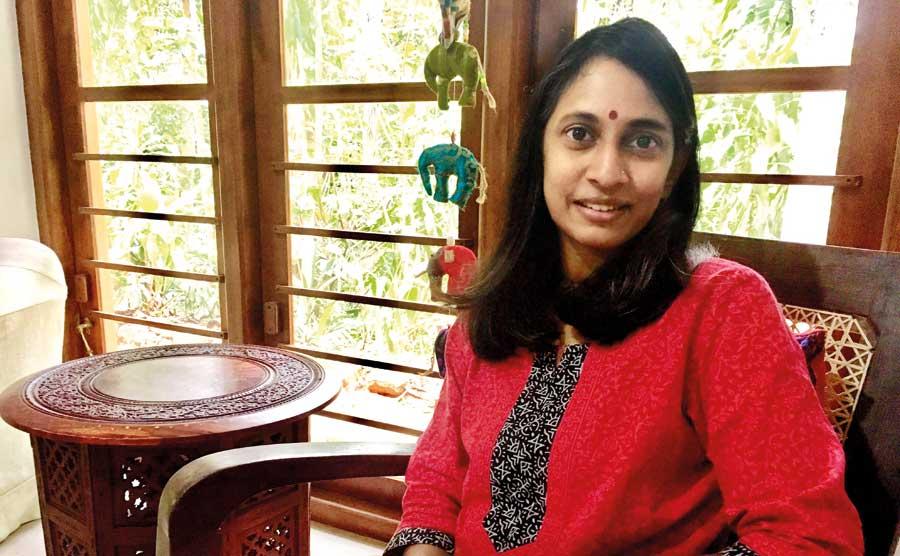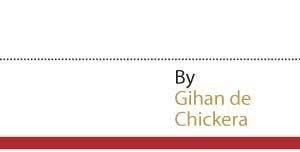12 Jul 2021 - {{hitsCtrl.values.hits}}
First Sri Lankan to win Commonwealth Short Story Prize

Pic by Quincy Saul
- Fiction allows you to set the terms of your world
- Stories of ordinary women have been buried
- Capitalism requires women’s subjugati
- Writing progammes are for the privileged
- Childbirth has become terribly medicalised
Writer Kanya D’Almeida became the first Sri Lankan to win the ‘Commonwealth Short Story Prize’ awarded for the best new writing to emerge from the 54-country bloc. At an online award ceremony on June 30, the competition judges hailed her winning entry ‘I Cleaned the—’as a story that “brims with humanity” and “appeals to both the heart and mind of the reader”. D’Almeida herself says it’s a story about “two destitute, ageing women in Sri Lanka digging through the debris of their lives in search of a little dignity”. Here she speaks to the DailyMirror on a range of issues spanning the personal and the political.
for the best new writing to emerge from the 54-country bloc. At an online award ceremony on June 30, the competition judges hailed her winning entry ‘I Cleaned the—’as a story that “brims with humanity” and “appeals to both the heart and mind of the reader”. D’Almeida herself says it’s a story about “two destitute, ageing women in Sri Lanka digging through the debris of their lives in search of a little dignity”. Here she speaks to the DailyMirror on a range of issues spanning the personal and the political.
"The day I won the award was just another day in rural Sri Lanka. This wasn’t a ‘win’ for the families living around me—they were far more concerned with how to share one working smart phone among all the students preparing for their A/Levels via zoom classes; or what to do about fertilizer"
 Q As much as this award is a personal achievement, it’s also being viewed as a win for Sri Lanka. How does this make you feel?
Q As much as this award is a personal achievement, it’s also being viewed as a win for Sri Lanka. How does this make you feel?
At first, this felt wonderful. An entire nation sharing this moment with me? What a beautiful thing. Then I started to ask myself: which Sri Lanka? Whose Sri Lanka? I recently moved to a small village in the Uva Province. My neighbours are all farmers. The day I won the award was just another day in rural Sri Lanka. This wasn’t a ‘win’ for the families living around me—they were far more concerned with how to share one working smart phone among all the students preparing for their A/Levels via zoom classes; or what to do about fertilizer; or the fact that they only receive piped water three or four days a week. It has been a very humbling experience to be among farmers at this particular moment. Far from lining up to interview me, they joke about my inability to identify a single medicinal plant in my immediate environment!
Q You say this story is for women who’ve taken their stories to the grave. And in your words, you say you want to share stories on “raucous, raunchy, rebellious, rude, real” women. What makes you want to tell these stories?
Because these are the stories that have been buried. Go into any bookshop, or museum, or library in the world and you will find yourself surrounded by the works and tales and exploits of men. Where are the memoirs and biographies of the ordinary women who held their families together during a flood, who withstood a thousand indignities but woke up to make breakfast the next morning? What about the ones who refused to accept their lot in life and were branded criminals, insane, and locked up or institutionalized? Now that I’ve started actively looking for these stories, I feel as though I’ve accessed the portal to another world: so many women, some who I’ve known my whole life, are coming out with absolutely epic tales that they might not have shared with anyone. A very exciting (and slightly daunting) prospect.
"During the advent of capitalism, women were forcibly and violently marginalised from the newly-created market economy, stripped of their land, burned at the stake in the thousands during the witch hunts, confined to the realm of unpaid domestic work and finally reduced to mere reproductive machines—‘breeders’ of the workforce"
Q Why do you feel fiction is the last free place to envision and execute radical change?
In fiction, you get to set the terms of your world. You don’t have to listen to the cynics who say this is not possible or that is not possible. As long as you craft a story well, you can take your readers along for any ride. When was the last time you managed to convince someone in conversation that it’s possible for us to live in a more decent world? I’ve never had much success with this—I’ve been called an idealist, laughed at, been condescended to, or ignored. But inside my stories, I am all-powerful. It’s not that I’m always writing utopias; often I am simply representing things as they are, which is to say, pretty bad! But other times, like with “I Cleaned the—“, I challenge myself to imagine better endings, victorious endings for people who otherwise never get to win.
Q In ‘I Cleaned the—’ you note that people think it is love that fuels labour, when really it is labour that generates love. What political connotations does this sentiment hold for today’s society?
I don’t know if this particular line has any political connotations. It is something deeply personal to the narrator. In fact, even I don’t agree with her on this. I find much of the labour involved in childcare to be quite thankless! But on the question of women’s labour in general, I have this to say:
Women’s labour is undervalued. Why? It’s not because of divine intervention or natural biological selection. During the advent of capitalism, women were forcibly and violently marginalised from the newly-created market economy, stripped of their land, burned at the stake in the thousands during the witch hunts, confined to the realm of unpaid domestic work and finally reduced to mere reproductive machines—‘breeders’ of the workforce. This was done primarily in the West, and then exported to the rest of the world via colonialism and slavery. So discussing the “political connotations” of women’s labour, for me, requires a critique of capitalism as a system that was built upon—and requires—women’s subjugation.
"Personally, I don’t ask myself questions like, ‘What right do you have to tell this story?’ I ask, ‘Does this story feel true to me? Can I write this story with honesty and integrity?’ If I can answer ‘yes’ to those latter questions, I will follow that story wherever it may lead me"
Q How has your education in creative writing helped you hone your craft, and how important are writing programmes for aspiring authors?
I am very reluctant to answer this question because writing progammes are largely the realm of the super-super-privileged. Few can afford them, many go into debt as a result, and contrary to popular belief it is not asecret lever that will open doors to literary agencies and publishing deals. But I must confess that I could not have written this particular story without the education I received in the United States, particularly in my Master’s programme at Columbia University. Here I was made to dissect stories and study their anatomy. I was taught the ‘architecture’ of building a scene. I was told to experiment with time, and observe how time works in fiction. But most crucially I was cured of the notion that a writer must be inspired to write—I was told very frankly that those most likely to succeed were not the ‘best’ writers but the people who dragged themselves to the page day after day, no matter how painful the prospect, and produced new work.
Q What should writers consider when contending with the ethics of representation, especially when ‘representation’ is inherent to the narrative technique?
I can’t advise other writers on this because I am still figuring it out for myself. Truth and honesty are two pillars I lean on heavily—which might seem strange when speaking of fiction! I am not suggesting that one only writes what one ‘knows’. On the contrary I think fiction should be an excavation of the imagination, and the beauty of the imagination is that it knows no bounds! But even inside one’s own imagination one is not free of a certain degree of responsibility to the world. Personally, I don’t ask myself questions like, ‘What right do you have to tell this story?’ I ask, ‘Does this story feel true to me? Can I write this story with honesty and integrity?’ If I can answer ‘yes’ to those latter questions, I will follow that story wherever it may lead me.
"In fiction, you get to set the terms of your world. You don’t have to listen to the cynics who say this is not possible or that is not possible. As long as you craft a story well, you can take your readers along for any ride"
Q You are also in the process of compiling a short story collection. How is that developing?
Slowly, I have a toddler!
Q Many Sri Lankan writers find it hard to sustain themselvesas full-time writers. How can this be tackled?
I don’t personally know any full-time writers—I’ve heard they exist but I’ve never met them. Every writing professor I had was a professional novelist who was also teaching to make a living. I wrote the bulk of this particular story on my phone, one sentence at a time, often while nursing my son in the middle of the night. Unless you are one of those rare birds who gets to enjoy huge commercial success in their lifetime, I don’t think you ever get to be anything other than a full-time human. And if you are the kind of human who wants and needs to write, then write on.
"Personally, I don’t ask myself questions like, ‘What right do you have to tell this story?’ I ask, ‘Does this story feel true to me? Can I write this story with honesty and integrity?’ If I can answer ‘yes’ to those latter questions, I will follow that story wherever it may lead me"
Q Finally, what plans do you have moving forward?
I am producing a podcast called ‘The Darkest Light on birth and motherhood in Sri Lanka’. I believe we are on the cusp of a mothers-led movement for better birth rights in Sri Lanka, and I am very excited to be a part of it. It’s a project that is deeply connected with my desire to unearth women’s stories and re-value women’s labour—including the labour that goes into childbirth. Childbirth has become terribly medicalised. Labouring women are seen as a liability, a nuisance, hystericalcreatures that mustbe restrained, anesthetised, and made to behave in accordance with the convenience of hospital procedures, always subordinate to the expertise of (mostly male) obstetricians. We have come dangerously close to completely losing our instincts when it comes to childbirth, not to mention our bodily autonomy. It’s time for us to reclaim it.
28 Dec 2024 2 hours ago
28 Dec 2024 2 hours ago
28 Dec 2024 3 hours ago
28 Dec 2024 3 hours ago